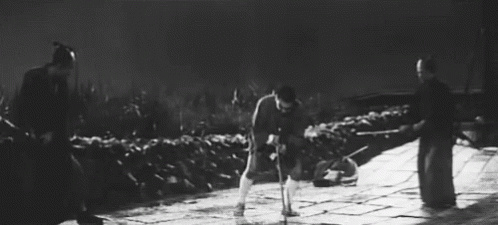Question about the Finishing Move Martial Arts Technique, the relevant chunk of the rules reads as follows:
Special Complex Action
(Ė10 to Initiative Score, spend 1 Edge)
The character must declare that he is performing a Finishing Move combination. The character makes an attack. If the character successfully damages an opponent with the melee attack, the character can then make an immediate extra strike against the same opponent with a +2 dice pool modifier.
Here's my question, how does this interact with the Multiple Attacks Free Action?
The attackerís dice pool is calculated with all modifiers ... and then split as evenly as possible between all attacks, and each attack is handled separately.
It is probably easier for me to say how I think it works, and ya'll can chime in to tell me where I'm wrong:
Let's assume, to keep the math simple, that Hero McCool has AGI 6 and Blades (Kenjutsu) 4/6, for a total Kenjutsu Dice Pool of 12 and there are no other modifiers in play. Hero McCool knows the Finishing Move Martial Arts Technique, he's rolled the highest Initiative, and is fighting two Goons. Everybody's got a katana, because of course they do.
Hero McCool declares his actions for the Action Phase: His Free Action will be to make a Multiple Attack splitting his 12 dice evenly, 6 for each Goon. His Complex Action will be a Finishing Move.
Question 1: Hero McCool hits Goon #1, does damage, and invokes his Finishing Move to make his immediate extra strike against Goon #1 with a +2 dice pool modifier... So how many dice does he roll for his extra strike?
Option A: Roll 8 dice. (
McCool's split Dice Pool of 6 with the +2 modifier.)
Option B: Roll 14 dice. (
McCool's Kenjutsu Dice Pool of 12 with the +2 modifier.)
In either case, Hero McCool will then continue with his Multiple Attack, hitting Goon #2 and doing damage.
Question 2: At this point, can he invoke his Finishing Move and make an immediate extra strike against Goon #2?
Option A: Yes. (
McCool satisfies the "If the character successfully damages an opponent with the melee attack" condition of the Finishing Move, so the "then" part of the If/Then rule must go through.)
Option B: No. (
McCool already used this on Goon #1 adn you cannot double dip.)
And of course, this leads us to Question 3, which is basically just Question 1 all over again: How many dice does the immediate extra strike against Goon #2 have?
